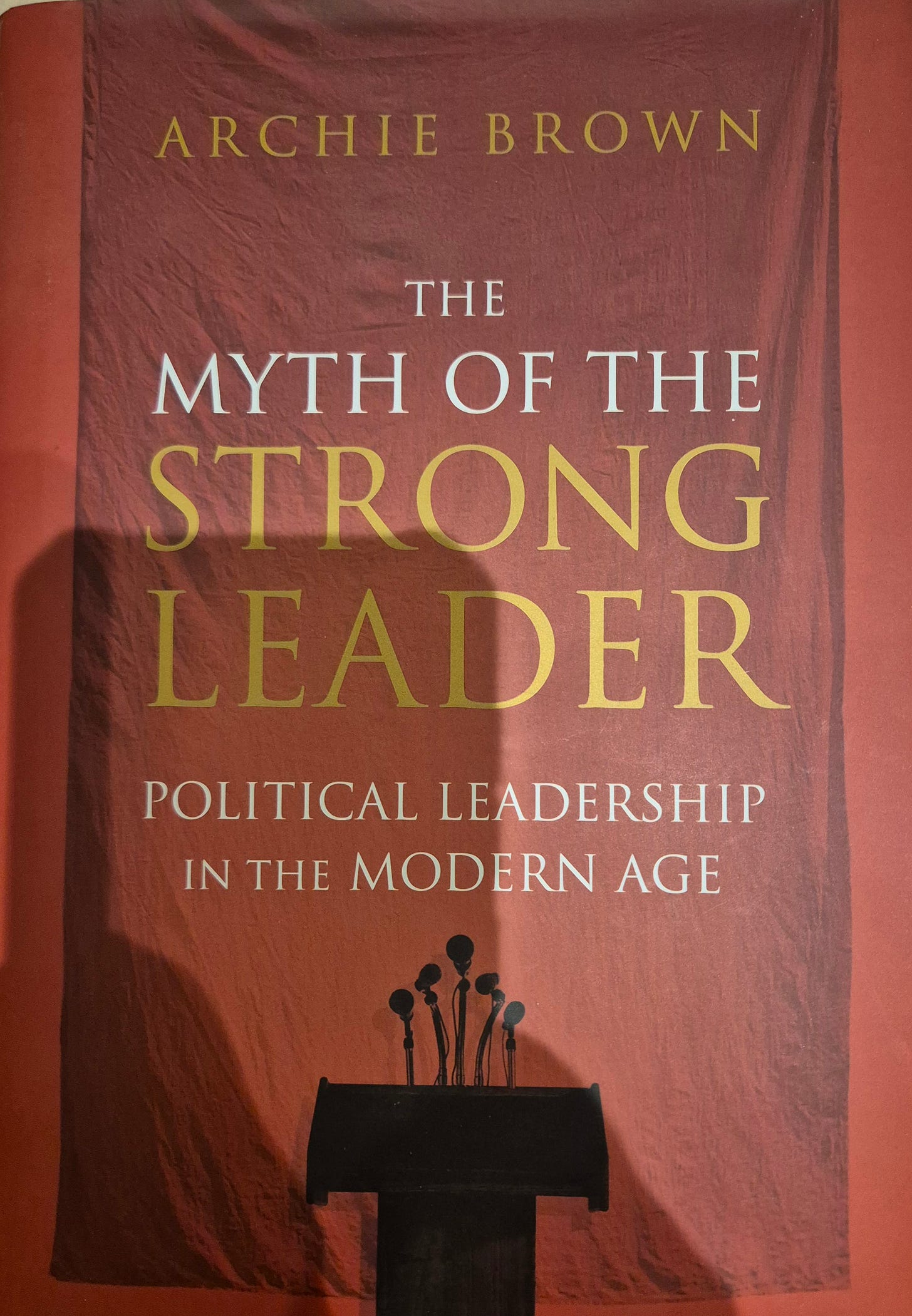Part I: Rethinking Leadership – Beyond the Myth of the Strong Leader
Archie Brown’s (2014) The Myth of the Strong Leader: Political Leadership in the Modern Age
Archie Brown’s The Myth of the Strong Leader: Political Leadership in the Modern Age is the book for out time, but written long before our times - the hardback was published in 2014 (reviewed by Bill Gates here). It’s a most peculiar experience re-reading it now, refracting it through the lens of the present - you will search in vain for Donald Trump’s name in the index. Similarly missing are Jair Bolsonaro, Javier Millei, Robert Fico, Narendra Modi, Viktor Orbán…
The indexed names present are now historic - but the lessons provided are definitely and definitively not historic.
Brown asks us to question the deeply-ingrained notion that effective leadership must emanate from a singular, forceful personality, brandishing some form of invincible authority. Instead, Brown argues real leadership flourishes as the outcome of collective cognition, ethical deliberation, and the balancing of institutional power.
I’m going revisit Brown’s arguments here and examine how historical insight and modern psychology can reshape our understanding of political leadership - especially of the ‘shouty man’ variety we are bedevilled1 with at the moment.
challenging conventional narratives
For decades, the archetype of the “strong leader” has dominated political conversation - the history counterpart of this conversation are arguments over the ‘great man’ driving historical change. Brown shows that romanticizing individual dominance overshadows the profound benefits of collaborative governance. The narrative of the lone hero is not only misleading but, as Brown warns, dangerous.
His central thesis can be summarized in three core points: the fallacy of individual strength; perils of overreach and authoritarianism; embracing collegiality in governance.
fallacy of individual strength
Brown contends emphasising personal charisma and lone-person decision-making is an oversimplification that ignores the importance of diverse perspectives, leading to overreach and poor policy. Leadership, he argues, should be less about heroic individualism and more about listening, learning, and integrating multiple viewpoints. Effective decision-making arises not from one person’s unchallenged authority, but from synthesising ideas, ethical reasoning, and the constructive tension of debate.
perils of overreach and authoritarianism
When leaders cultivate an image of unyielding strength, they risk sliding into authoritarianism. Brown provides historical examples where the illusion of decisive leadership masked a suppression of dissent and, ultimately, catastrophic outcomes. Under the guise of decisiveness, these leaders often disregard institutional checks and the necessity for broad-based consultation. The very traits that are lauded as hallmarks of strength—confidence, decisiveness, and unwavering conviction—become the mechanisms through which destructive power is consolidated.
embracing collegiality in governance
In democratic systems, legitimacy stems from the collective—not the solitary leader. Brown’s work champions collegial leadership, where decisions emerge through consensus and the interplay of diverse ideas, where power is distributed among institutions, and ethical decision-making is checked by accountability and debate.
Embracing collegiality means the leader’s role shifts from that of a commanding figure to a facilitator who marshals collective wisdom; this means moving away from a “heroic” model of leadership towards a “distributed” or “shared” leadership model.
insights from cognitive and social psychology: equating confidence with competence
We are very often predisposed to favour strong confident personalities as leaders: we often often equate confidence with competence. The "halo effect" cogntive bias can also play a role, where a leader's perceived confidence in one area leads to positive assumptions about their abilities in other areas. However, these self-same processes can be redirected to support more inclusive, participatory forms of leadership: our inherent biases may lean towards confident personalities, but leadership theory and practice increasingly recognises the value of inclusive and participatory approaches.
Relevant reading
Authoritarians: Some just want to watch the world burn; others prefer spreadsheets
Authoritarians and authoritarianism (part 1) There's a lot of it about
cognitive biases and the illusion of control
Below the line:
social Identity and the dynamics of followership
evolution beyond tribalism
patterns of authoritarianism and the benefits of distributed power
cultural variations in leadership
shouty man interlude
contemporary relevance
populism and the simplification of politics: ‘i alone can fix it’ the stupidity of tariffs, and finding a spine
defending democratic institutions
the digital challenge
conclusion: toward a new understanding of leadership
Next time: Resisting the Allure of Strongman Politics







